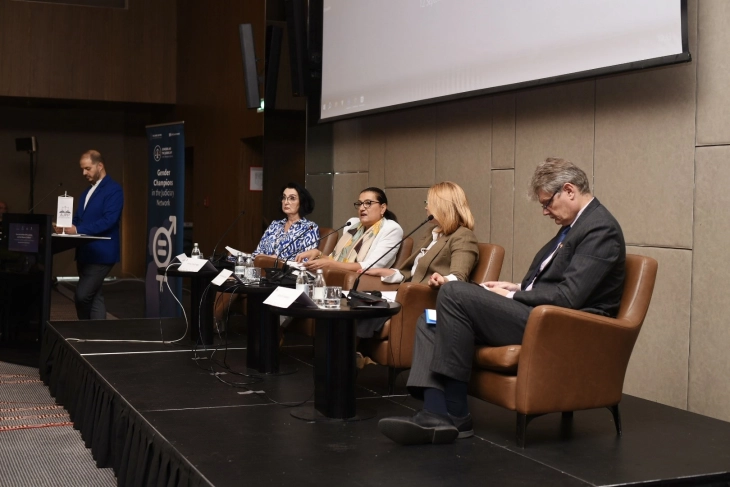Conference: Preventing femicide by taking timely measures and intersectoral cooperation
- Though North Macedonia is the first country in the region to treat femicide as a crime, a number of cases are still reported. Over the past four years, 17 femicide cases were prosecuted in North Macedonia for the killing of 19 women.

Skopje, 12 September 2023 (MIA) - Though North Macedonia is the first country in the region to treat femicide as a crime, a number of cases are still reported. Over the past four years, 17 femicide cases were prosecuted in North Macedonia for the killing of 19 women.
A report on femicide in North Macedonia was presented at Tuesday's conference on “Femicide in North Macedonia and the Western Balkans – International Standards and Case-Law of Courts”, organised by the AIRE Centre and Academy of Judges and Public Prosecutors of North Macedonia, with the support of the Government of the United Kingdom.
Majority of femicides examined as a part of the report were carried out using cold weapons, with firearms being the second most common. Among the 17 perpetrators, the majority were unemployed and had psychosis. Out of 17 court proceedings examined as a part of this report, in 14 cases the court found perpetrators guilty and sentenced them to imprisonment. In three proceedings, security measures were ordered (compulsory treatment in a health facility), given the fact that perpetrators were not mentally competent at the time of the crime.

Some of the participants in the conference pointed out that there is a good legislative for dealing with femicide, noting that the issue is with its implementation. According to them, femicide as the most difficult act of violence against women can be prevented though greater intersectoral cooperation and taking timely measures.
Minister of Labor and Social Policy, Jovanka Trenchevska, said that in addition to open communication, continuous education, changing the institutional approach, improving legal frameworks, legal obligation for due care when approaching each and every case, and implementing many campaigns to raise awareness, violence against women is still present.
According to her, the reason for not reporting such violence is due to fear from victims, in addition to the lack of trust in institutions, which leads to femicide or the murder of women.

"In 2019, three out of five deaths during domestic violence were femicides, in 2020 three out of four deaths during domestic violence were femicides. In 2022 the numbers unfortunately increased with six out of seven deaths being femicides. This year in the first quarter alone there were three femicides, and recently there were two more," Trenchevska said.
She called for greater intersectoral cooperation, social work centers and courts to take timely measures after a case has been reported as the only way to reduce or prevent femicide as the most difficult form of violence against women.
Natasha Gaber-Damjanovska, Director of the Academy of Judges and Public Prosecutors of North Macedonia, said that in North Macedonia, there are still no special records for femicide cases.
"The new amendments to the Criminal Code, in spite of not explicitly using the term ‘femicide’, successfully describe this aggravated crime according to the modern understanding thereof. Generally speaking, the legal framework in relation to gender-based violence and domestic violence provides good grounds for action, but a lot of work must still be done to strengthen its implementation. Also, serious work should be done on the establishment of a penal policy that will more adequately and more severely punish the perpetrators of this crime," said Gaber-Damjanovska.

Kosana Beker, Programme Director of FemPlatz and Regional Board Member of Gender Champions in the Judiciary Network (GCJ Network), stressed that North Macedonia is the first country in the Western Balkans region that introduced a separate criminal offence of femicide within recent changes of the Criminal Code in March 2023.
"Our Regional report clearly showed the need for separate incrimination of femicide, and we are very satisfied with the fact that North Macedonia is a positive example of good practice in the region. Now it is up to the judiciary of North Macedonia to put that provision in practice, as well as to fulfil other recommendations from the Regional report in close cooperation with the AIRE Centre and GCJ Network”, said Beker.
Publications “Femicide in the Republic of North Macedonia: The State of Affairs, the Legal Framework and the Court Practice” and “Regional report on judicial response to femicide in the Western Balkans” can be found on the official website of the Gender Champions in the Judiciary Network. ssh/nn/
Photo: MIA / Ministry of Labor and Social Policy







